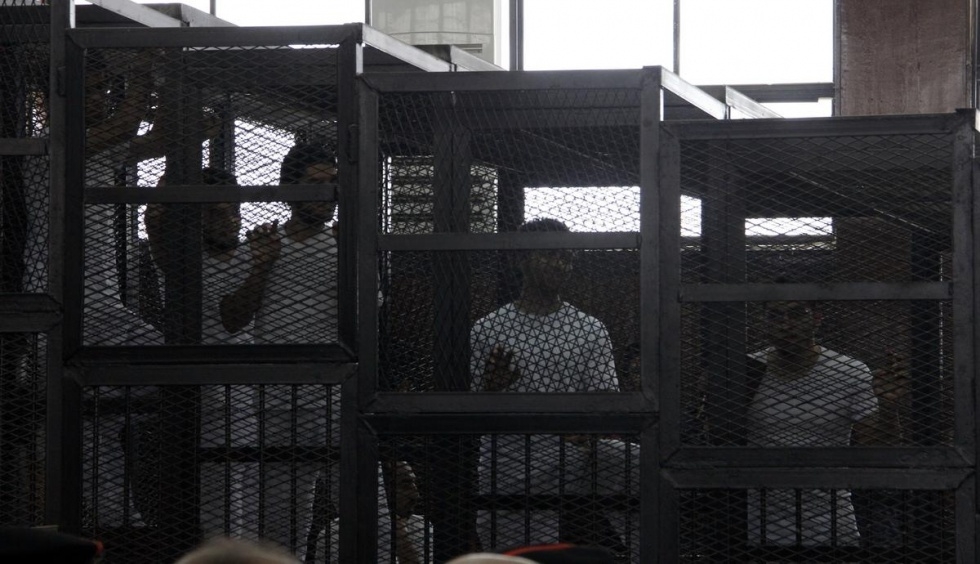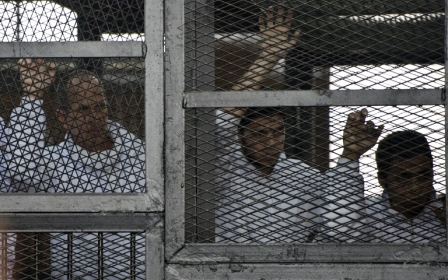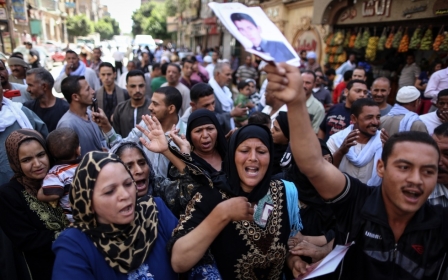International condemnation grows over journalists' sentencing in Egypt

An Egyptian court's decision to sentence three Al-Jazeera journalists to jail sentences has been widely condemned by the international community, with US Secretary of State John Kerry calling it “draconian”.
Al-Jazeera journalists Peter Greste, Mohamed Fahmy and Baher Mohammed were on Monday sentenced to seven years in prison by an Egyptian court for "falsifying news" and belonging to or assisting the banned Muslim Brotherhood. Mohamed was sentenced to a further three years for possessing a bullet casing.
In addition to the three Al-Jazeera journalists, the Egyptian court also tried 11 more people in absentia and handed them up to ten years of jail term. These others included Dutch journalist Rena Netjes, Cairo correspondent for the Dutch daily Parool.
Dutch Foreign Minister Frans Timmermans said that Egypt was acting contrary to the international obligations and Netjes did not get a fair trial.
Kerry condemned the sentences one day after meeting with Egyptian President Abdel Fattah al Sisi in Cairo, calling them “chilling” and “draconian.”
“Yesterday, President al-Sisi and I frankly discussed these issues and his objectives at the start of his term as president,” Kerry said in a statement released to the press. "I call on him to make clear, publicly, his government’s intention to observe Egypt’s commitment to the essential role of civil society, a free press, and the rule of law."
He further said that Egyptian authorities should “review all of the political sentences and verdicts pronounced during the last few years and consider all available remedies, including pardons.”
Kerry expressed the US concerns over the convictions and sentences during a telephone conversation with Egyptian Foreign Minister Sameh Shoukry on Monday.
The UN Secretary-General Ban Ki-moon also expressed his deep concern over the recent court decisions in Egypt, particularly the confirmation of death sentences for 183 people and the sentencing of journalists.
"Proceedings that clearly appear not to meet basic fair trial standards, particularly those resulting in the imposition of the death penalty, are likely to undermine prospects for long-term stability," the UN chief's spokesperson said in New York.
Ban stressed that participation in peaceful protests or criticism of the government should not be grounds for detention or prosecution.
UN rights chief Navi Pillay said journalism "is not a crime" and urged Egypt to "promptly release" those jailed for doing their job.
Australian Foreign Minister Julie Bishop said: "We are deeply dismayed that a sentence has been imposed and appalled at the severity of it."
"It is hard to credit that the court in this case could have reached this conclusion," she said, adding Canberra would look at possible intervention in the case.
Egypt press union let down by 'harsh' Jazeera verdicts
An Egyptian Journalists' Syndicate board member has described Monday's jail sentences as "extremely harsh" adding that it could have the effect of "harming Egypt's reputation".
"The verdicts are both shocking and very harsh," Gamal Fahmi told Anadolu Agency. "They could end up harming Egypt's reputation."
Fahmi asserted that the Egyptian authorities should have differentiated between the network's management and its journalists.
"We're against issuing tough court sentences against journalists in general," he said.
The Egyptian Journalists' Syndicate, meanwhile, has said it stands in solidarity with the convicted journalists.
In a statement, the syndicate noted that the verdicts were not final, calling on the convicted newsmen to use legal channels to appeal the sentences.
Al Jazeera 'shocked'
Al Jazeera on Monday said it was shocked by the prison sentences doled out to some of its correspondents.
The network said the hefty jail terms "defied" logic and violated press freedom.
"These verdicts were surprising and shocking," Al Jazeera network chief Mustafa Sawaq said in a statement. "Al Jazeera condemns them."
Sawaq said the trial had featured not only the prosecution of the Al Jazeera journalists, but of the press in general.
"We won't stop defending our colleagues against the injustice that has befallen them for doing their work properly, professionally and honestly," he added.
The Egyptian authorities, he asserted, "must shoulder the responsibility of their decisions before the international community."
Al Anstey, managing director of Al Jazeera's English service, said the verdicts "defied logic."
"Today, three colleagues and friends were sentenced and will continue to be kept behind bars for doing a brilliant job of being great journalists," he said.
"[They are] 'guilty' of covering stories with great skill and integrity [and] 'guilty' of defending people's right to know what is going on in the world," Anstey said in a statement.
He added that his colleagues had been sentenced to jail despite the fact that not "a shred" of evidence had been produced to support what he called the "extraordinary" and "false" charges against them.
"At no point during the long drawn out 'trial' did the absurd allegations stand up to scrutiny," Anstey said. "There is only one sensible outcome now – for the verdict to be overturned and justice to be recognized by Egypt."
Families of journalists devastated
The two bothers of Australian journalist Peter Greste, who was sentenced to a seven year jail term, were upset by the verdicts and said: "I'm just stunned," "It's difficult to comprehend how they can have reached this decision" said Andrew Greste, according to the Guardian.
At a press conference in Brisbane, Peter Greste’s father told reporters that the family was "devastated" and "shocked" by the verdict in Cairo.
"This is a very dark time, not only for our family but for journalism generally,"
"To us, it is not just affecting the Greste family. We put it to you that it is also a slap in the face and a kick in the groin to Australia as well as all fair minded people around the world," he added.
"Journalism is not a crime, or you should all be behind bars,'' said Greste.
But according to the BBC, Greste’s family did no comment on the Egyptian court system in Egypt , as there are hopes of a pardon by Sisi and there were fears that criticism could impede any diplomatic progress with the Egyptian government.
The Greste family said that they had not yet decided on what their strategy would be in lieu of the Egyptian ruling.
Present at the court ruling was also brother of Mohamed Fahmy, the bureau chief of Al Jazeera English in Cairo. Who commented on the ruling by saying:
"This is not a system," he said. "This is not a country. They've ruined our lives. It shows everything that's wrong with the system: it's corrupt. This country is corrupt through and through."
"On the basis of the evidence that we've seen, we can't understand the verdict," said Ralph King, the Australian ambassador in Cairo.
Ambassadors summoned
Several countries announced plans to summon Egyptian ambassadors to protest what many called an unjust verdict.
The Australian Associated Press news agency said officials were seeking to summon the Egyptian deputy envoy Tuesday, while Foreign Minister Bishop planned to speak directly with Cairo.
"We are going to register a formal diplomatic-level request with the new president of Egypt to see if he can intervene in the proceedings at this stage," AAP quoted Bishop as telling Australia's Seven Network.
In The Hague, Foreign Minister Frans Timmermans said he had summoned Egypt's ambassador and would raise the matter with his EU colleagues after Dutch journalist Rena Netjes, tried in absentia, "did not get a fair trial".
London said it was "completely appalled" by the verdict in absentia against the two Britons and was summoning Cairo's envoy.
Human Rights Watch's Joe Stork said the verdict showed "how Egypt's judges have been caught up in the anti-Muslim Brotherhood hysteria fostered by President al-Sisi".
On Sunday an Egyptian court confirmed death sentences for more than 180 Islamists including Brotherhood chief Mohamed Badie.
Pillay slammed such mass trials and sentences as "obscene", and urged Egypt to review its laws.
But Egypt insisted the "judiciary enjoys full independence" and said the convicts "still have the right to appeal".
A presidency official said Sisi "legally can't (pardon them)... a pardon can be given only after the final court ruling".
Of the six defendants in custody along with Greste, Fahmy and Mohamed, four were sentenced to seven years and two were acquitted.
"They will pay for this, they will pay for this. I promise!" Fahmy shouted from the dock upon hearing the verdict.
All of the defendants had been accused of aiding the blacklisted Brotherhood and tarnishing Egypt's reputation after the ouster of Islamist president Mohamed Morsi by "spreading false news".
Since the army ousted Morsi in July 2013, the authorities have been incensed by the Qatari network's coverage of their deadly crackdown on his supporters.
They consider Al-Jazeera to be the voice of Qatar and accuse Doha - which has denounced the repression of the Islamist movement's supporters which has killed more than 1,400 people - of backing the Brotherhood.
'There is no justice'
"All journalists should fear for themselves now that there is no justice. Politics is the master," said defence lawyer Shaaban Saeed.
Al-Jazeera says nine of the 20 defendants are on its staff, including the Britons.
Sixteen Egyptians were convicted of belonging to the Brotherhood.
The defendants had dismissed the evidence as "fabricated".
Prosecutors showed video from a tourism report, not even produced by Al-Jazeera, and images and audio recordings in which the defendants were alleged to have falsely portrayed a "civil war".
Greste is a former BBC reporter who won the 2011 Peabody Award for a documentary on Somalia, while Fahmy previously worked with CNN.
Relations between Egypt and Qatar have deteriorated markedly since last summer, when elected president Mohamed Morsi – who had counted Doha as a regional ally – was forcibly removed from office by the military.
Qatar had condemned Morsi's ouster, while Al Jazeera – which has continued to report almost-daily pro-Morsi protests – has remained at the center of tensions with Cairo.
Egyptian authorities have waged a wide-ranging crackdown against members of the Muslim Brotherhood since July, when Morsi was ousted and imprisoned by the army.
New MEE newsletter: Jerusalem Dispatch
Sign up to get the latest insights and analysis on Israel-Palestine, alongside Turkey Unpacked and other MEE newsletters
Middle East Eye delivers independent and unrivalled coverage and analysis of the Middle East, North Africa and beyond. To learn more about republishing this content and the associated fees, please fill out this form. More about MEE can be found here.



